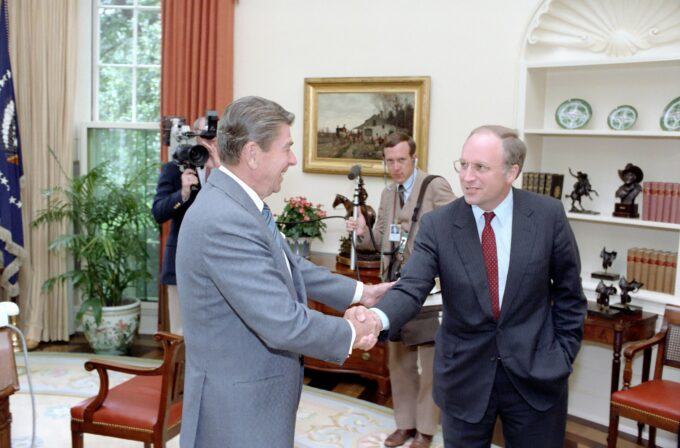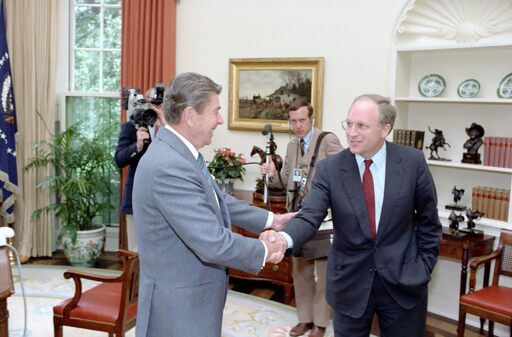

Photograph Source: Cheney meets with President Ronald Reagan, July 1983 – Public Domain
Modern medical science gave Dick Cheney one of its greatest gifts when he received a donor heart in 2012 at the age of 71. Thirty-four years earlier, Cheney had suffered his first heart attack; he had a second heart in 1984. In 1988, at the age of 47, Cheney suffered his fourth heart attack, and then a fifth heart attack in 2010 at the age of 69. After every attack, according to Dr. Charles C. Hong, Cheney benefitted from a medical breakthrough until he received the donor heart.
There is no indication that Cheney ever softened his headline views on domestic and foreign policy as a result of these near-death experiences. During his eleven years in Congress, Cheney’s record was strictly reactionary. He opposed federal funding for abortions, with no exceptions in the case of rape or incest. He voted against the equal rights amendment for women. On education issues, he consistently opposed funding of Head Start, and he voted against creating the Department of Education, which Donald Trump has virtually destroyed.
A true westerner, Cheney voted against a ban on armor piercing bullets, often referred to as “cop killer” bullets. He was one of only four members of the House voting against a ban on plastic guns that could slip through airport security machines undetected. Not even the National Rifle Association opposed this ban. In 1988, he voted to scrap a proposed national seven-day waiting period on handgun purchases.
Cheney would have fit in nicely with the Trump team on environmental issues. He opposed refunding the Clean Water Act, and voted to postpone sanctions placed on air polluters who failed to meet pollution standards. Cheney consistently voted against legislation to require oil, chemical and others industries from making public records of emissions known to cause cancer, birth defects and other chronic diseases.
Cheney consistently voted to increased defense spending, and supported aid to the Nicaraguan rebels, even after a moratorium on funding was passed. When then-Senator Patrick Leahy challenged Vice President Cheney’s support for illegal aid to the Nicaraguan Contras, Cheney responded with “go fuck yourself,” which said a great deal about both his personality and his contempt for Congress. When President George H.W. Bush moved to end the war against Iraq in 1991 without entering Baghdad, Cheney was strongly opposed,
Cheney knew that “personnel is policy” and supported the troglodytes who dominated President George W. Bush’s national security team, particularly Jay Bybee and John Yoo, who drafted the policy guidance that gave cover to the Central Intelligence Agency’s torture and abuse policies, gently referred to as “enhanced interrogation techniques.” He also bolstered the policies and influence of other reactionaries in the administration, such as John Bolton, David Addington, and Paul Wolfowitz.
When asked in 2014 about the CIA’s torture and abuse program, which provided no intelligence on terrorist operations, Cheney offered no contrition. “I would do it again in a minute,” he said. And I might add that no CIA executive officer offered any resistance when CIA director George Tenet described the sadistic program, which included such executives as John Brennan, who became Obama’s CIA director.
Lewis “Scooter” Libby, known as Cheney’s Cheney, was a consummate operator and advisor in making sure that Cheney’s orders were followed by the bureaucracy. When George W. Bush refused Cheney’s pleas to provide a pardon to Libby, who had lied to a grand jury about his role in disclosing the identity of a CIA clandestine officer, the Bush-Cheney relationship suffered greatly.
Cheney consistently opposed any measure that supported accountability in the government, such as the War Powers Act, intelligence oversight, the Presidential Records Act, the Foreign Intelligence Surveillance Act, and any measure that supported freedom of information. His emphasis was on enlarging presidential authority, and he often cited those items in the Federalist Papers that supported greater presidential powers.
Cheney’s legacy can best be seen in the national security problems that Barack Obama and Joe Biden inherited in 2009, particularly the unnecessary war against Iraq that was in its sixth year. There was also the war in Afghanistan, in its 8th year, and difficult security problems with Iran and Pakistan. Bush and Cheney did their best to get the United States bogged down in distant wars that had no clear strategic purpose, and cost huge amounts of blood and treasure. When the Israelis wanted the United States to use military force on their behalf, they called on Cheney to get the president to agree. Fortunately, Bush didn’t comply, and the Bush-Cheney disputes eventually led to the demise of Cheney’s influence in the administration. The two men were barely speaking to each other by 2008.
Cheney created an imperial vice presidency. If left to his own devices, the American empire would have been even more supportive of unsavory dictators, more involved in regime change, and more likely engaged in the kind of mindless invasions such as the Bay of Pigs. At Cheney’s initiative, the United States stripped terror suspects of long-established right sunder domestic and international law.
The Founding Fathers tried to create a president who would act as an “administrator,” but Cheney sought to expand presidential power, which is now referred to as the power of the “unitary executive.” He had contempt for the Congress, which he described as a “collective, deliberative body” that”slowed down decisions” and “subjected them to compromise.” He certainly would have been at home in the Trump administration, although—in all fairness—he supported his daughter’s position with respect to Trump’s effort to overthrow the government in 2020.
The post Dick Cheney: Two Hearts, But Remained Heartless appeared first on CounterPunch.org.
From CounterPunch.org via this RSS feed


